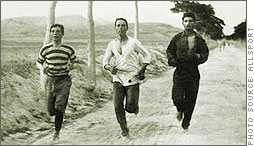The birth of the modern Olympic Games

Marathon runners, Greece 1896
"I hereby proclaim the opening of the first International Olympic Games at Athens." With these words on April 6, 1896, King George I of Greece welcomed the crowd that had gathered in the newly reconstructed Panathenean Stadium to the modern-day Olympic Summer Games.
The event was the idea of Baron Pierre de Coubertin of France who traveled the world to gather support for his dream to have nations come together and overcome national disputes, all in the name of sport.
If not for the generous private donations of Greek businessmen like George Averoff, these first Olympics might have been moved to Budapest, Hungary. Averoff generously offered to pay for the reconstruction of Athens' Panathenean Stadium which had been built in 330 B.C.E. This left the Greek government with enough money to build a venue for the shooting competition and a pier for the swimming events.
The program for the Games included track and field, fencing, weightlifting, rifle and pistol shooting, tennis, cycling, swimming, gymnastics, and wrestling. Although 14 nations participated, most of the athletes were Greek.
The Games reached their high point on Day 11 with the first modern-day marathon. The idea to hold an event to commemorate the Ancient Olympic games was suggested by a friend of de Coubertin and was met with great anticipation. The race was run from Marathon to Athens (estimated at 22–26 miles), watched by more than 100,000 people and won by a Greek runner, Spiridon Louis.
From the moment Louis entered the stadium for the final leg of the race the home crowd roared with pride. The thrill and excitement reverberated through to the Games' finale-the ceremonial march of nations.
De Coubertin was pleased with the first games and stressed to organizers the importance of moving the Games all around the world. This was disappointing to Athens, which wanted to be a permanent host, but set into motion the international festival we know today as the Olympic Summer Games.

No comments:
Post a Comment